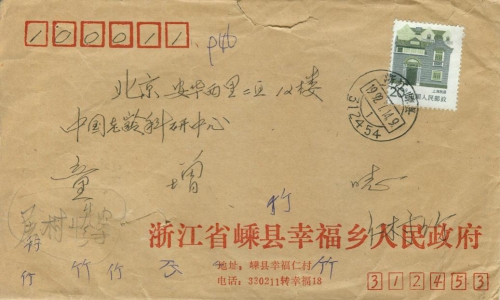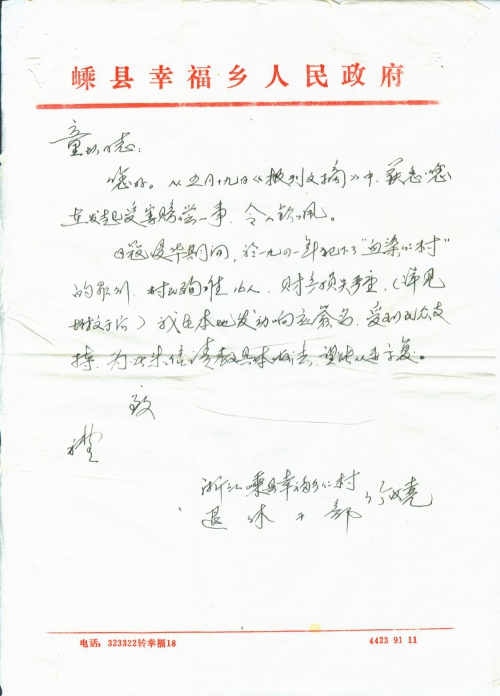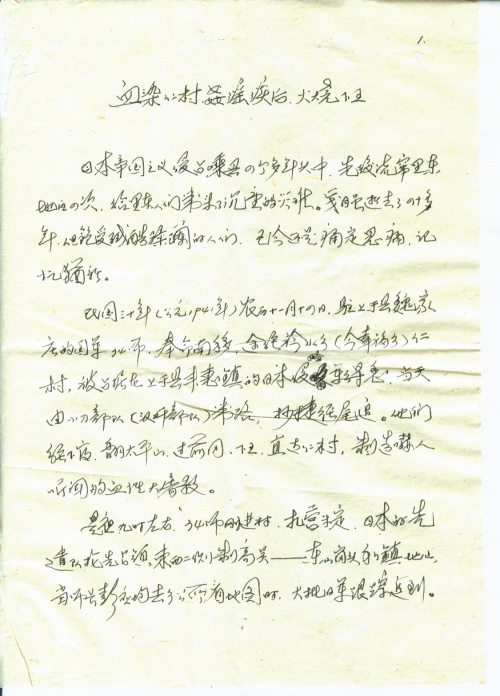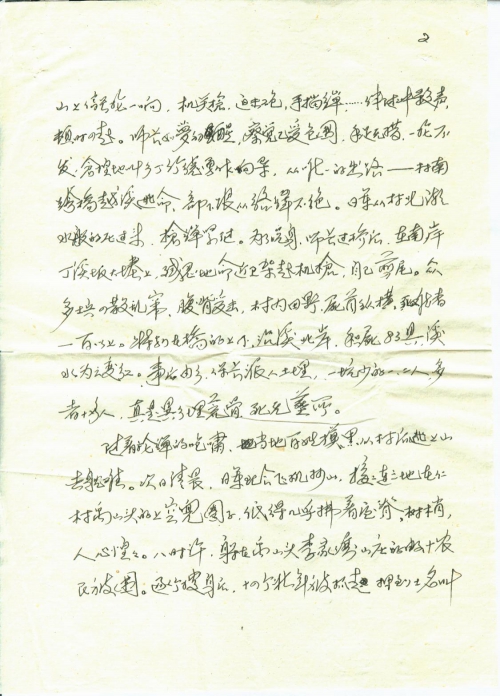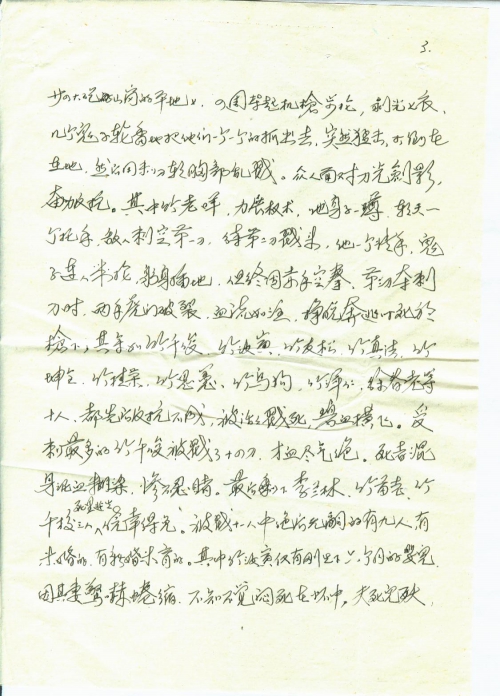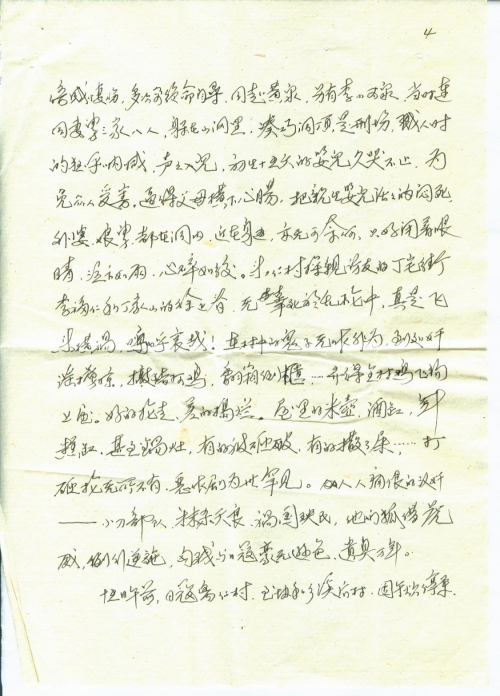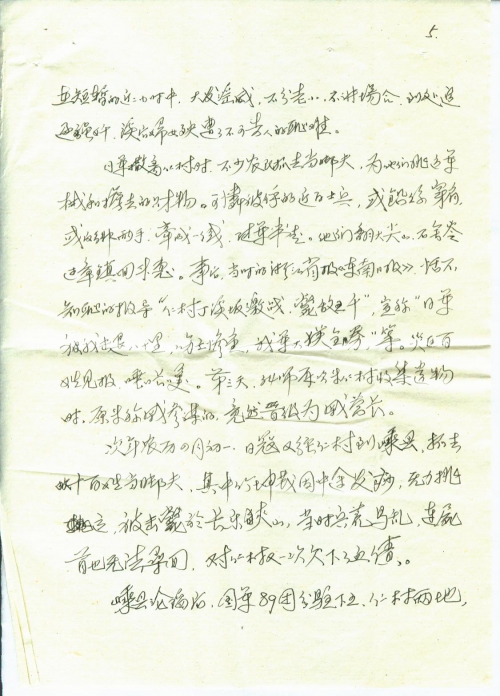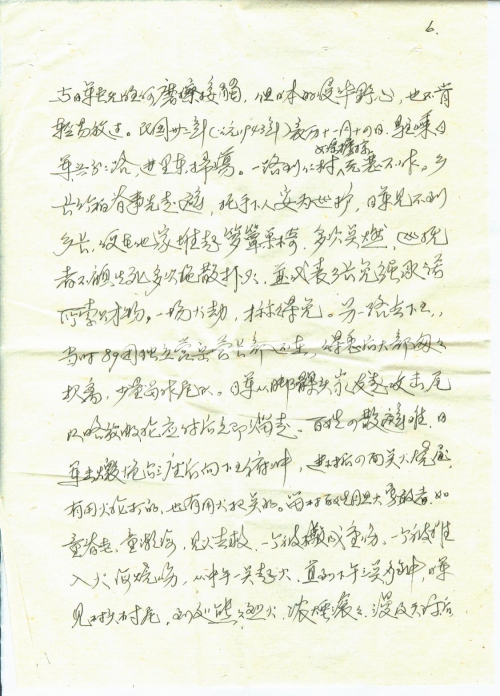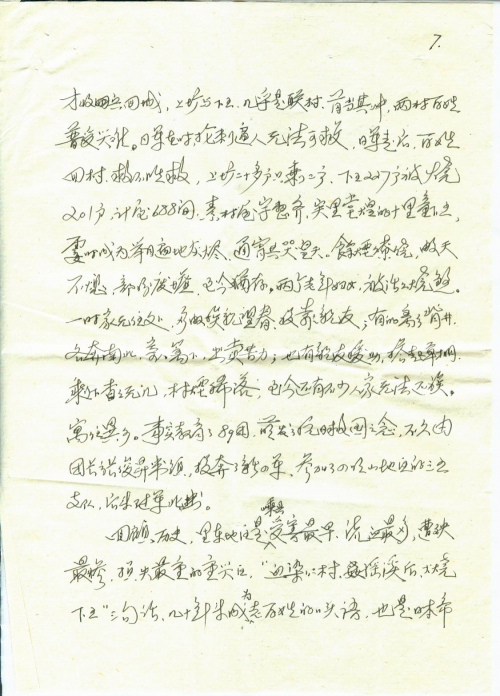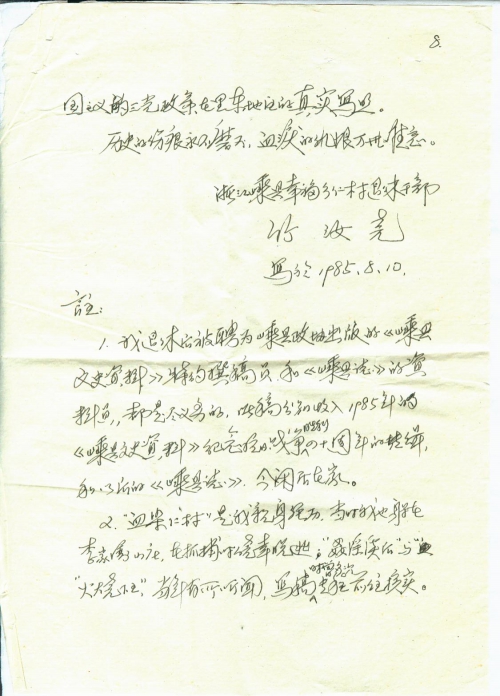Date of letter:1992-07-14
Address of author:Sheng County, Shaoxing City, Zhejiang Province
Date of event:1941-1943
Location of event:Sheng County, Shaoxing City, Zhejiang Province
Name of author:Zhu Rao
Name(s) of victim(s):People of Sheng County
Type of atrocity:Other Massacres, Rapes, Others(OM, RA, OT)
Other details:The Japanese Army committed massacre in Rencun in 1941. When they tried to captured me I luckily escaped, during this period 16 villagers died, the loss of property was heavy. I initiated signature campaign and received support from villagers. In the following years they raped women and committed all sorts of crimes in our village.
Comrade Tong Zeng:
Hello!
From the “Newspaper and Magazine Digest” on May 19, I learned that you are initiating a damage reparation campaign, which is really admirable.
During the time of Japanese invasion, the Japanese Invasion Army committed the “Slaughtering Rencun” crime in 1941. 16 villagers met their disastrous end and property losses were heavy (see attached text). I started a signature campaign in the local area as a response to the article and received endorsements from the public. For this purpose, I write this letter to seek further instructions on how to proceed. I look forward to receiving your reply as soon as possible.
Regards
Sincerely yours
Retired cadre of Rencun, Xinfu Town, Sheng County, Zhejiang
Zhu Yao
Slaughtering Rencun, Raping Xihou, Burning Xiawang
During the four plus years of occupation of the Sheng County, the Japanese Imperialists intruded into Lidong area four times, which brought huge calamity to the Lidong people. Although more than forty years have passed, people who suffered deeply from the cruel ravage still detest their painful experiences today. Such memories are still vivid.
In the 30th year of the Republic of China (1941 AD), on November 14 on the lunar calendar, the Chinese Nationalist Army, 34th Division, stationed in Weijiazhuang, Shangyu County, was instructed to relocate toward south, passing through Jinshui Town (now Xinfu Town) Rencun. However this piece of news was learned by the Japanese Invasion Army stationed in Laihui Town, Shangyu County. On the same day, the “Xiaodao” traitor gang led the Japanese troops through a shortcut to track the Nationalist Army. They passed Xiaguan, crossed Taiping Mountain, passed Qiangang, Xiawang, and arrived at Rencun, where they created a horrifying bloody massacre.
At around 9 o’clock in the evening, the 34th Division of the Nationalist Army entered the village. Just when they were setting up the camp, the Japanese Army’s vanguard soldiers had occupied the eastside mountain top and the Zhendi Mountain, the two commanding high points in the east and west, respectively. When the 34th Division Commander, Peng Yingjun, went to the Town Administration Office to look at the local map, a large number of Japanese troops arrived in pursuit. After the flare gun was fired, machine guns, trench mortars, hand grenades……accompanied by war-cries, erupted from all sides. As if waking up from a dream, the Division Commander sensed that they were surrounded; he was at a loss. Without firing a shot, he hastily asked townsfolk Zhu Raoyong to be a guide and went to the only escape route – by crossing the bridge over a stream in the south side of the village. His subordinates followed him in a flock. The Japanese Army swarmed from the north side of the village like a flood accompanied with gun shots. In order to escape safely, after the Division Commander crossed the bridge, he cruelly asked his guardsmen to put up machine guns on south side of the Dingxiban Bridge to cut off his followers. Many soldiers scurried. Attacked from both ends, bodies littered the field inside the village. Over one hundred people died. In particular, above and below the bridge and on the north bank of the stream, there were 83 bodies. The stream turned red. After the incident, the Town Head dispatched workers to bury the dead; some pits contained one to two bodies, others contained as many as over a dozen bodies. It was indeed a case of dying in a strange land with no proper interment.
As the bullets and shells flew in the air, local residents fled, through the back of the village in darkness, to the mountains to seek shelter. In the morning of the next day, the Japanese Army, accompanied by aircrafts, conducted a search. The aircrafts repeatedly circled above Yushan Mountain top in Rencun. They flew so low that the aircraft wings almost appeared to touch rooftops and treetops. People were very frightened. At about 8 o’clock, several dozen farmers from Lijiawan Mountain Village, who were hiding on top of the Yushan Mountain, were surrounded. After body searches were made, 14 youths were taken away and escorted to a place called Dengsidapao hummock. They were stripped naked and surrounded by machine guns and rifles. Several Japanese soldiers, taking turns, singled them out, one at a time. The victims were punched until they collapsed to the ground and were then stabbed in the chest with bayonets. Confronted with bayonets and guns, they tried hard to resist. Among them, Zhu Laomie possessed a few combat skills. He crouched and shoved upward; the enemy soldier missed the target in the first stabbing attempt. When the second stabbing attempt came, he turned sideways and the Japanese soldier fell to the ground with his rifle. Nevertheless, because he was unarmed, when he went for the bayonet in the third stabbing attempt, his two hands were wounded. Bleeding profusely, he broke free but was shot dead while running away. The remaining ten persons including Zhu Qiansuo, Zhu Ruyin, Zhu Yousong, Zhu Zhenfa, Zhu Kunquan, Zhu Guirong, Zhu Siyuan, Zhu Wugou, Zhu Yangren, and Xu Chunlao were all stabbed to death after some futile resistance. Blood splashed everywhere. The one who was stabbed most number of times, Zhu Qianjun, received fourteen stabbings before his death. The dead bodies were smeared with blood all over. What a horrible scene to witness. Finally, only three persons, Li Lanlin, Zhu Loiulao, and Zhu Qianxiao, narrowly missed death and survived. Among the 11 people who were stabbed to death, 9 of them had no offspring, including unmarried or newly married but without children. Wherein Zhu Ruyin had a six-month old baby; his wife was so frightened that she involuntarily curled up her body and inadvertently suffocated the baby in her bosom. With both husband and son dead, she felt most miserable and repeatedly wanted to commit suicide to join her loved ones. In another case, Li Xiaoke’s family, along with his wife’s brothers’ families totaling 8 people were hiding in a mountain cave. Unfortunately, the stabbing ground was right above the cave. The excruciating screams at the time of stabbing could clearly be heard by the people in the cave. Their 15-day old baby cried incessantly. In order not to bring harm to others, the parents had no choice but to suffocate the baby to death. Both the grandmother and an uncle were in the same cave; close as they were, they too felt helpless. They could only close their eyes and cried in silence, Tears came down like rain and hearts ached as if they were being twisted. In addition, Li Furen from Dingzhai Street and Xu Shangchun from Dingjia Mountain, who came to Rencun to visit relatives and friends, were killed by stray bullets. It was indeed an unexpected disaster for them! Alas! Alas! The Japanese invaders committed all sorts of crimes in the village; everywhere they went, they raped, looted, attacked pigs and chickens, and rummaged trunks and cabinets to look for valuables……The whole village was thrown into a complete mess; everything valuable was taken away; anything of insignificant value was destroyed; rice urns, wine barrels, rice cake tanks, and even cooking pots were smashed to smithereens or pissed on……Clubbing, smashing and stealing occurred everywhere. Their evil deeds were rarely seen anywhere else in this world. The Xiaodao gang, a traitor group which was hated by everyone, flaunting their connections to the Japanese, obliterated any human decency and brought calamity to the country and people, Their perverse actions and cruelty matched those of the Japanese invaders’; their ill reputation will long be remembered.
Before noon on the 25th, the Japanese invaders left Rencun and came to Xihou Village in Xiehe Town, where they stopped to prepare for lunch. During almost two hours of break, they wielded their despotic power. Regardless of old or young, regardless of the location, they chased and raped women everywhere. Xihou women suffered indescribable harm and humiliation.
When the Japanese Army withdrew from Rencun, many farmers were captured to work as porters to carry military equipment and the looted articles for them. Nearly one hundred captured Chinese soldiers were stringed in one line, with ropes tied either around their shoulders or their hands in the back, and taken away by the troop. They crossed Dajian Mountain, Shishe Ridge, and passed Zhang Town. After the Japanese withdrawal, the then Zhejiang provincial paper “Southeast Daily” shamelessly reported that “In the battle of Rencun Yuxuban, 5000 enemies were killed.” It also declared that “the Japanese Army was beaten back for 80 li, and suffered heavy casualties. Our army won a complete victory.” When residents of the disaster area read the newspaper, they spit and sighed. On the third day, when the 34th Division returned to Rencun to collect leftover things, the one who was previously called Staff Officer Qi was even promoted to Battalion Commander Qi.
On April 1 on the lunar calendar in the following year, the Japanese invaders again passed Rencun to go to Sheng County. They captured several dozen commoners as porters. Among them was Zhu Kunmao. He suffered a heatstroke on the way and was unable to carry any load; he was killed at Changlexia Mountain. At the time, everything was in turmoil and chaos due to the war; no one was able to find his body. This is another debt of blood owed to Rencun.
After the fall of Sheng County into the Japanese hands, the 89th Regiment of the Nationalist Army was stationed at two locations, Xiawang and Rencun. Though they had neither conflict nor contact with the Japanese Army, the Japanese aggressors would not easily let them be. On November 14 on the lunar calendar in the 32nd Year of the Republic of China (1943 AD), the Japanese Army in Sheng County entered Lidong from three different directions in a mopping-up campaign. One branch entered Rencun, raped, looted, and committed countless crimes. Town Chief Zhu Baichun escaped in advance but instructed his subordinates to patrol the territory properly. Unable to find the Town Chief, the Japanese Army piled bamboo baskets, tables, and chairs in his home and lit the pile with fire many times. A patrol, without paying attention to his own safety, extinguished the fire every time. On behalf of the town chief, he also grudgingly promised to provide valuables being requested thus averted a fire disaster. Another branch went to Xiawang. Commander Yue of the Independent Battalion of the 89th Regiment and his troop were still there at the time. After learning that the Japanese Army was coming, most of the Battalion retreated hurriedly leaving a few soldiers trailing behind. The Japanese Army launched the attack from Jiaoketou’s compound, the trailing group fired a few token shots and slipped away in haste. Villagers scattered around trying to escape. The Japanese Army destroyed three gun turrets and then swooped down toward Xiawang. After entering the village, they burned houses in every direction using either fire guns or torches. Those remaining villagers, who were bold enough, such as Tong Chunlao and Tong Chaohai, wanted to put out the fire but failed. Sadly one was beaten and suffered serious injuries and another was pushed into the fire and suffered burns. The fire began around 1 o’clock and lasted till after 3 o’clock in the afternoon. The Japanese Army only retreated after seeing that fires were everywhere in the village and that billowing smoke covered the sky. Shangkuang and Xiawang, two villages almost next to each other, bore the brunt of the savage acts. Residents in both villages suffered great disasters. When the Japanese Army were there, they stabbed anyone who got close so firefighting was impossible; after the Japanese Army left, the villagers retuned to the village, but it was already too late. Among more than 20 households in Shangkuang, only two were left; 201 out of 227 households in Xiawang were burned, totaling 688 houses. The previously magnificent Xiawang with neat rows of houses was destroyed in an instant with only ashes left all over the ground. Everyone wailed throughout the night. Smoke lingered for several days. Some relics are still standing today. Two old women were killed in the fire. Suddenly homeless, most people had to ask relatives or friends for help. Some left their hometown and went their separate ways to live with others or to work as laborers; others relied on assistance from relatives and friends and built thatched shacks. Only very few remained; the village was almost deserted. Until today, many people are still unable to return to their hometown and, instead, live in other towns. These events taught the 89th Regiment a lessen and inspired their volition to fight the Japanese and save the nation. Soon the Regiment Commander, Zhang Junsheng, led the regiment to join the New Fourth Army, and was incorporated into Sanwu Detachment in the Siming Mountain area. Later they marched northward along with the troop.
Looking back at the history, Lidong area is a heavy disaster area in Sheng County. It received the earliest persecution, shed the most blood, bore the most tragic disasters, and suffered the heaviest losses. The epithet “Slaughtering Rencun, Raping Xihou, and Burning Xiawang” has become a catchphrase among local commoners for decades since. It is also a truthful depiction of the ‘Burn All, Kill All, Loot All’ policy of the Japanese Imperialism in the Lidong area.
The scars of history will never vanish; the hatred made from blood and tear is never forgotten.
Retired cadre of Rencun, Xingfu Town, Sheng County, Zhejiang
Zhu Ruyao
1985.8.10
Note:
1. After retirement, I was hired as a special contributor of the “Sheng County Cultural and Historical Data” published by Sheng County Political Consultative Conference, and an information officer of the “Sheng County Annals.” Both were volunteer jobs. This article was first printed in the special edition of the “Sheng County Cultural and Historical Data” in 1985 to commemorate the 40th anniversary of the victory against Japan and then the “Sheng County Annals.” Now I stay at home.
2. “Slaughtering Rencun” is personally experienced by myself. At that time, I also hid in Lijiawan Mountain Village and was lucky enough to escape the capture. I had heard “Raping Xihou” and “Burning Xiawang” though I was not there; and I personally travelled there many times to verify the details while preparing the manuscript.














